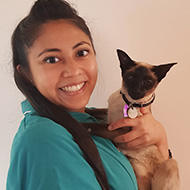Australian veterinary student scoops prestigious award

Sarah Daphe Foo wrote the winning Knowledge Summary.
A student from Australia has been named the winner of the Veterinary Evidence Student Awards 2022 - the first time an international submission has received first place.
Final year veterinary medicine student Sarah Daphne Foo from the University of Sydney, Australia, wrote the winning Knowledge Summary, which explores the evidence behind supraglottic airway devices versus endotracheal intubation for stable anaesthesia in rabbits.
Sarah chose this topic in response to the rising number of people taking on rabbits as pets and the subsequent need for procedures requiring general anaesthetic. Her study discovered evidence to back up using both devices to maintain stable anaesthesia in rabbits, concluding that the final airway maintenance device should ultimately depend on the available equipment, the practitioner's training, and the treatment that will be performed.
Commenting on her win, Sarah said: “'As a final year student hoping to publish my first paper, I was excited by the opportunity to participate in this competition, and I am honoured to receive this award. As someone very new to veterinary research and publication, I felt supported throughout the process, and feel much more confident in writing future Knowledge Summaries.
"I chose my Knowledge Summary topic as I have a special interest in exotics and zoo medicine and hope to specialise in the future once I graduate from the DVM at the end of this year. It was a question I found myself asking whilst working in general practice throughout my degree, and I hope it is useful to others in the veterinary profession. I look forward to contributing future Knowledge Summaries to Veterinary Evidence.”
The prestigious Veterinary Evidence Student Awards, run by veterinary charity RCVS Knowledge’s peer-reviewed journal Veterinary Evidence, recognise and support students’ engagement with evidence-based veterinary medicine and its application into practice.
Second place was awarded to veterinary medicine students Narakhanti Soenardi and Maxim Bembinov, from the Royal Veterinary College in London, for their Knowledge Summary titled ‘An assessment of client and clinician satisfaction in veterinary teleconsultation compared to in-person consultations’.
Dr Kit Sturgess, editor-in-chief of Veterinary Evidence, said, “It gives me great pleasure to be involved in the Veterinary Evidence Student Awards again this year. The enthusiasm of the applicants and the quality of the work they produce is amazing and gives me great confidence in the future of the veterinary profession.
"This year we have had a diverse group of submissions covering a range of species, diseases, and professional topics with submissions from around the globe, emphasising the value of Veterinary Evidence to the worldwide veterinary community. Huge congratulations to those students who have won awards and great respect for everyone who has used their time and energy to submit a piece of work for external scrutiny as this takes courage, resilience and commitment."



 The Veterinary Medicines Directorate (VMD) is inviting applications from veterinary students to attend a one-week extramural studies (EMS) placement in July 2026.
The Veterinary Medicines Directorate (VMD) is inviting applications from veterinary students to attend a one-week extramural studies (EMS) placement in July 2026.